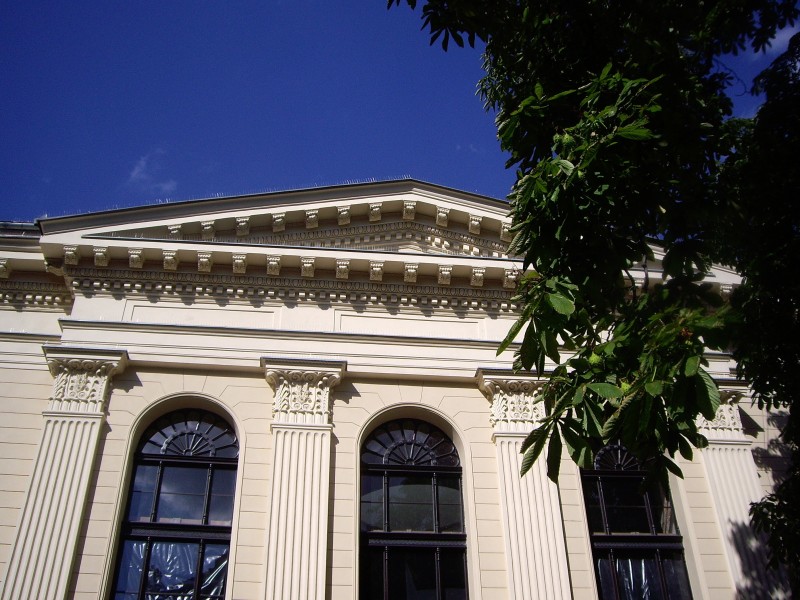Workshop: The Jews of Breslau/Wrocław: A Digital Biography. Digital Humanities Projects –Approaches and Experiences

16.06.2022 um 14:00 Uhr
BKGE Oldenburg, 14:00 UhrThe BKGE and the Taube Department of Jewish Studies at the University of Wrocław in Poland invite to participate in a one-day workshop at the BKGE in Oldenburg.
Short Project Description
The Jews of Breslau/Wrocław: A Digital Biography is to be a digital source-based, and source-powered project that constructs a cutting-edge research tool for the analysis of texts, sounds, and images of the 800-year history of the Jewish communities of Breslau/Wrocław. Ultimately, it hopes to offer a new tool for research in digital humanities and to allow for unlimited searchability, together with the mapping of textual, visual, and spatial data from a source-driven database that will be a virtual representation of an urban history. This will include digital reproductions of documents, artifacts, visual images, and other types of symbol-based sources all inter-linked so as to generate, via search engines, groups of datasets that meet specific criteria. For an academic audience, the project is to construct a richly structured base of selected primary sources as well as their chrono-spatial correlations. For non-academics, the project is to provide a searchable interface between the metadata base and a dedicated website allowing for source-based synthesis, including popular entries on people, places, and events. In addition, a scholarly monograph will both analyse these selected issues in their chrono-spatial dynamics and indicate wider possibilities provided by the database as a research tool.
Technically, the project is to result in an open code and open source engine enabling multi-layered advanced search and chrono-spatial processing of large historical datasets. The enhanced study of chrono-spatial and social correlations of each source against the greater data pool may very well lead to a methodological shift in the critical approach to sources in the broader context of available historical materials.
PROGRAM
Thursday 16 June 2022
14:00 Welcome (Matthias Weber, BKGE; Marcin Wodziński, Uniwersytet Wrocławski, Katedra Judaistyki)
14:15 Introduction (Beate Störtkuhl, Maria Luft, BKGE)
14:30 Presentation and Discussion
Marcin Wodziński (Uniwersytet Wrocławski, Katedra Judaistyki):
The Jews of Breslau/Wrocław: A Digital Biography.
15:00 Coffee Break
Presentations and Discussions
15:30 Thomas Kollatz (Digitale Akademie Akademie der Wissenschaften und der Literatur, Mainz): Linked data: People, Places, Events, Topics. Experiences from epidat (research platform for Jewish epigraphy) and Buber Korrespondenzen Digital
16:00 Sinai Rusinek (Haifa):
Metadata bridges: the case of three Jewish Studies Digital Humanities Projects
16:30 Coffee Break
Presentations and Discussions (continued)
17:00 Gerhard Weilandt (Kunstgeschichte, Universität Greifswald):
Methods and Challenges of Virtual Research Environments. TOPORAZ – Topography of Nürnberg in Time and Space
17:30 Anna Menny (Institut für die Geschichte der deutschen Juden, Hamburg):
The Hamburg Key Documents Edition. Experiences and Future Perspectives
18:00 Ruthie Kaplan (Haifa):
Directories, Tax Records and Ego-Documents – Sources for a Spatial Research of the Jewish Community in Łódź, Poland, During the Interwar Period
18:30 End of the first part
19:30 Dinner
Friday 17 June 2022
Presentations and Discussions (continued)
09:00 Gerben Zaagsma (Centre for Contemporary and Digital History, Université du Luxembourg)
Jewish history and the politics of digitisation
09:30 Maja Hultman (Centre for European Research, University of Gothenburg):
Finding Emotions through Digital Mapping
10:00 Janis Lutz (Jüdisches Museum, Frankfurt am Main):
Digital Approaches and Applications at the Jewish Museum Frankfurt
10:30 Coffee break & video
11:00 Video: Arnost Stanzel (Osteuropa-Abteilung, Bayerische Staatsbibliothek, München):
OstData & OstDok: Research Data Management and Electronic Publishing for Eastern and Southeast European Studies
Presentations and Discussions (continued)
11:15 Tim Buchen (BKM-Juniorprofessur für Soziale und ökonomische Netzwerke der Deutschen im östlichen Europa im 19. und 20. Jahrhundert, TU Dresden):
Settlement Projects and Land Distribution. Tracing Ethnic Germans and Property Transfers in Volynia, Courland, and Pommerania 1900–1945
11:45 Cornelia Eisler (BKGE Oldenburg):
Changing the Perspective: Digital Humanities Projects as an Object of Study
12:15 Lunch
12:45 Final discussion – perspectives
14:00 End of the conference
